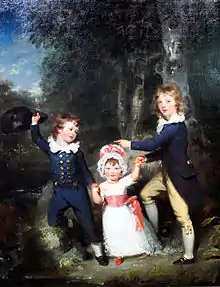George Cavendish, 1st Earl of Burlington
George Augustus Henry Cavendish, 1st Earl of Burlington (31 March 1754 – 9 May 1834), styled Lord George Cavendish before 1831, was a British nobleman and politician. He built Burlington Arcade.
The Earl of Burlington | |
|---|---|
%252C_1st_Earl_of_Burlington.jpg.webp) Lord Cavendish, 1st Earl of Burlington | |
| Born | 31 March 1754 |
| Died | 9 May 1834 (aged 80)[1][2] Burlington House, London, England[3] |
| Nationality | British |
| Title | 1st Earl of Burlington |
| Spouse(s) | Lady Elizabeth Compton
(m. 1782) |
| Children | 11 |
| Parent(s) | William Cavendish, 4th Duke of Devonshire Lady Charlotte Boyle |
Background
Cavendish was the third son of William Cavendish, 4th Duke of Devonshire and the former Lady Charlotte Boyle, daughter of Richard Boyle, 3rd Earl of Burlington of the first creation, whose title had become extinct upon his death in 1753.[4]
Political career
Cavendish sat as Member of Parliament for Knaresborough from 1775 to 1780, for Derby from 1780 to 1797 and for Derbyshire from 1797 to 1831. On 10 September 1831 he was raised to the peerage as Baron Cavendish of Keighley, in the County of York, and Earl of Burlington, a revival of the title held by his maternal grandfather.[5]
Horseracing
He had horseracing interests. His racing silks were straw colour with a black cap. [6]
Family
.jpg.webp)
In 1815, Lord Burlington bought Burlington House in Piccadilly from his nephew, the 6th Duke of Devonshire. With the architect Samuel Ware, he made a number of significant modifications to the house, including the building of Burlington Arcade along the west side. He died at Burlington House in 1834 and was buried in All Saint's church, Derby. The property passed to his widow and on her death in 1835 to their son Charles.[7]

He married Lady Elizabeth Compton, only child of Charles Compton, 7th Earl of Northampton, on 27 February 1782 in London. They had at least 11 children, of whom six children survived to adulthood, although his two eldest sons predeceased him:[4]
- William Cavendish (10 January 1783 – 17 January 1812)
- George Henry Compton Cavendish (14 October 1784 – 22 January 1809)
- Elizabeth Dorothy Cavendish (12 June 1786 – 17 September 1786)
- Lady Anne Cavendish (11 November 1787 – 17 May 1871), married Lord Charles FitzRoy, second son of the 4th Duke of Grafton
- Gen. Hon. Henry Frederick Compton Cavendish (5 November 1789 – 5 April 1873), married Sarah Fawkener, Frances Susan Lambton and Susanna Emma Byerlie
- Elizabeth Cavendish (13 March 1792 – 26 May 1794)
- The Hon. Charles Compton Cavendish (28 August 1793 – 10 November 1863), created Baron Chesham, married Lady Catherine Gordon, daughter of the 9th Marquess of Huntly
- Mary Louisa Cavendish (6 March 1795 – 7 June 1795)
- Lady Caroline Cavendish (5 April 1797 – 9 January 1867)
- Frederick Compton Cavendish (28 October 1801 – 27 January 1802)
- Charlotte Cavendish (23 April 1803 – 1 July 1803)
The Earl was succeeded in his earldom by William, the son of his own eldest son William, who had been killed in a carriage accident in 1812.[4]
References
- Lodge, Edmund (1867). The Peerage and Baronetage of the British Empire as at Present Existing. Hurst and Blackett. p. 179. Retrieved 8 November 2018.
- Debrett's Genealogical Peerage of Great Britain and Ireland. William Pickering. 1847. p. 114. Retrieved 8 November 2018.
- "Death of the Earl of Burlington". The Waterford Mail. 14 May 1834. p. 3. Retrieved 8 November 2018.
- Mosley, Charles, ed. (2003). Burke's Peerage, Baronetage & Knighthood (107 ed.). Burke's Peerage & Gentry. pp. 1128–1129. ISBN 0-9711966-2-1.
- "CAVENDISH, Lord George Augustus Henry (1754-1834)". History of Parliament Online. Retrieved 31 January 2018.
- Weatherby, Edward and James (1801). "COLOURS WORN BY THE RIDERS OF THE FOLLOWING NOBLEMEN, GENTLEMEN, &c". Racing Calendar. 28: 52.
- "Burlington House". British History Online. Retrieved 31 January 2018.
External links
- Hansard 1803–2005: contributions in Parliament by George Cavendish
| Parliament of Great Britain | ||
|---|---|---|
| Preceded by Sir Anthony Thomas Abdy, Bt Hon Robert Walsingham |
Member of Parliament for Knaresborough 1775–1780 With: Hon Robert Walsingham |
Succeeded by Hon Robert Walsingham; Viscount Duncannon |
| Preceded by Lord Frederick Cavendish Daniel Parker Coke |
Member of Parliament for Derby 1780–1797 With: Edward Coke |
Succeeded by Edward Coke George Walpole |
| Preceded by Edward Miller Mundy Lord John Cavendish |
Member of Parliament for Derbyshire 1797–1800 With: Edward Miller Mundy |
Succeeded by Parliament of the United Kingdom |
| Parliament of the United Kingdom | ||
| Preceded by Parliament of Great Britain |
Member of Parliament for Derbyshire 1801–1831 With: Edward Miller Mundy 1801–22 Francis Mundy 1822–31 Hon. George Venables-Vernon 1831 |
Succeeded by Hon. George Venables-Vernon |
| Peerage of the United Kingdom | ||
| New creation | Earl of Burlington 1831–1834 |
Succeeded by William Cavendish |